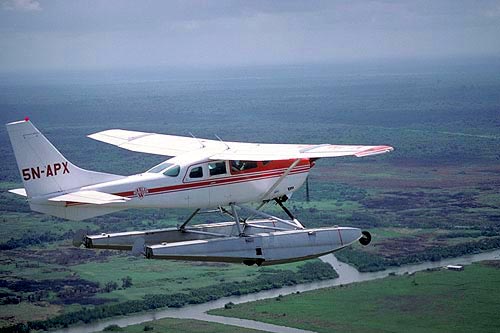The Cookie Bringer
![]()
Float
Flying Adventures in the Niger River Delta
![]()
 It was some time after Babangida’s
bloodless coup when most imports were still banned or at least strictly
controlled that we received a smuggled shipment of cookies. Imports
generally meant anything white people would want to use. White rice, white
flour and white sugar were on the top of the controlled list. The military
dictator’s reasoning was that black people did not use or need to use
white people’s stuff.
It was some time after Babangida’s
bloodless coup when most imports were still banned or at least strictly
controlled that we received a smuggled shipment of cookies. Imports
generally meant anything white people would want to use. White rice, white
flour and white sugar were on the top of the controlled list. The military
dictator’s reasoning was that black people did not use or need to use
white people’s stuff.
In fact, the reasoning was sound, but it had
nothing to do with blacks or whites. It had to do with basic economics.
Before the oil boom, Nigeria was self sufficient in agricultural
production and, in fact, exported enough home grown produce to have a
surplus budget. In other words, they made enough money on rice and millet
and chickens and palm oil to buy refrigerators and tires and aircraft
spare parts. World trade was working to the national benefit.
After the oil boom got into full swing the
entire economy stopped producing marginally profitable potatoes, tomatoes
and fattened goats and went to work in the oil fields. If you are not
producing, however, you are importing and very quickly the Nigerians
turned into a nation of importers. They began to import chocolate bars,
cookies, coffee, toffee, toothpaste, limousines, Palmolive soap, toasters,
kettles, umbrellas, and a myriad variety of other wise non-essential
goods.
Worse yet, despite the wealth of in-country
natural resources, the Nigerians found it was easier to take their
newfound oil cash and buy essential items that could have been mined or
refined or otherwise procured locally: such as coal, leather, lumber,
plywood, concrete, lime, rubber, copper wire, hops, barley, wheat, and
refined petroleum. Here was an oil producing country that produced far
more oil than they could consume wanting to import petroleum. At any one
time, the Lagos’ Tin-Can Port could have anywhere from 200-400 ships
lined up waiting to unload their cargo.
Babangida’s bloodless coup and the
following import bans were to stop this economic suicide. For me, however,
it meant having to bring in a suitcase full of Ivory soap, Crest
toothpaste, Scholl’s foot powder, Right Guard deodorant, Bic razors,
Head & Shoulders shampoo, and several packages of my favorite Wrigley’s
Juicy Fruit chewing gum. Sometimes I would even bring in a couple of
Coffee Crisp chocolate bars, but they would often melt and get sticky so I
usually avoided them. The suitcase represented a six-month supply, as that
was how long my in-country work contract would last.
Getting the banned goods past customs was
not a problem as long as you carried a couple of American dollars in your
shirt pocket and slid it into the right palm at the appointed time. “Thank-you
Captain, you are welcome, you may go.” Everyone was happy and I got my
goods intact.
I was working for the American pipeline and
dredging company Willbros Nigeria, flying their C206 amphib into the Niger
River Delta. The delta was, at the time, where the oil exploration and
development was concentrated. It was a perfect place to operate a
floatplane as the delta was made up of thousands of rivers running north
to south with all the oil workers needing to travel east to west. Going by
boat meant going north up one river and south down the other to traverse
westward. With the floatplane I could fly in a straight line and land
anywhere in the delta. Helicopters were still not an option, as it would
take from 2 to 3 years after a wildcat field was drilled and capped before
a production platform with the corresponding helipad would be placed on
the well.
So for an American company in a hurry, the
floatplane was the answer. For years I flew into the delta and in the
duration we opened up areas where the multitudes of native villagers had
never experienced anything remotely resembling technology. Mirrors,
watches, lighters, torchlights, thermoses, eyeglasses, binoculars, ice
cubes, and the like had never been seen. Not to mention an airplane. In
fact, many of the villagers had never ever seen a white man. I thoroughly
enjoyed my position as the pilot who commands “white man’s magic.”
One day, after dropping dredging engineers
at a new work site, I anchored on a Niger River tributary south of Nembe
Creek. The villagers here were not familiar with the aircraft and let me
be. Most were wary of the juju or magic of the mysterious flying canoe,
giving the floatplane and me a wide berth. As they paddled with the
outgoing flow of the river, they would unabashedly glare at me as if to
avert any bad spirits that might steal their way. Undoubtedly they had
heard stories around the evening fire told by the braver ones who had
ventured to visit with white men.
The day was calm and the fast flowing water
shone with the reflection of foliage and sky and clouds mixing like a
translucent vortex of green blue and white paint swirled in a gallon can.
The rain forest proximity was so powerful that I sat motionless on the
steps of the floats mesmerized by the intense presence of it all: the
chlorophyll fragrance of the oxygen saturated air, the dry mahogany heat
of the mellow sun, the connective tissue of fallen leaves and red mud
crabs, the belly splash of a transparent chameleon startled from above,
the popping of bubbles blown by emerging mud skippers, the clear air tune
of a malachite kingfisher wired directly to my eardrum like a taunt
stainless steel line, and the beckoning of the forest filtered water as if
a delta maiden were taking my hand and leading me to the river bed. All
this surrounded me as I sat and wondered what a Canadian boy from the
prairie was doing here.
I was going to be on anchor for hours
waiting for my passenger so I had brought a lunch. I could not leave the
floatplane unattended in case the tide turned or a storm passed and pulled
the anchor. I had previously lost the plane downstream several times, and
did not want a repeat performance. So I stayed on watch. I was
particularly looking forward to my lunch today, however, as I had brought
a treat.
Oil service companies, like Willbros, were
exempt from the import ban for all oil service related parts and
equipment. Much of that equipment was bought in the States and brought
overseas in containers. To run an American company with American workers,
however, Willbros knew they must stock American foods in the mess hall.
Anything less than Hersey's chocolate syrup, Aunt Jemima pancake mix,
Heinz ketchup, French’s mustard, Kraft Miracle Whip, and Nabisco Oreo
cookies would not be acceptable. So Willbros smuggled in Hormel’s canned
ham stuffed inside boxes of Caterpillar dozer parts, and Bush’s baked
beans hidden in boxes of welding rods.
Once we even got in a soft ice-cream machine disguised as a “concrete
analyzer” and the dry ice-cream mix as “drilling mud emulsifier.”
Today, however, I had a fresh bag of Dare’s
Chocolate Chip cookies. As I had been in country and cookie-less for the
past 6 months, this was going to be a treat beyond compare. Moreover,
since I was alone in the forest I did not have to share. I usually have no
problem with sharing, but hogging the Dare’s cookies was a hold over
from my days as a ten-year-old boy with two greedy sisters. They never had
to share, but because they were girls they could get away with murder. I
had to share or I was beaten. My mom denies it, but at least that is the
way I remember it.
After slowly eating my canned ham and cheese
sandwich, (of course the bread was made with illegally smuggled white
flour,) I waited as long as possible to open my bag of cookies. When I did
the oven-baked aroma of flour and baking powder and sugar and vanilla, and
of course chocolate weaken my resolve to wait any longer and I helped
myself. Many cookies and a cup of thermos coffee later I was satiated.
Only then did I look out and see a lone dugout canoe paddling silently
past.
I never thought for a second and waved them
over. Paddling in the front of the canoe was a delta women dressed in
native wrapper. She was sun weathered and dark as ebony with the only
protection from the sun being a smaller wrapper bundled on her head.
Paddling with obviously less enthusiasm in the rear was a head bare old
man wearing only a dirty worn cloth wrapped around his loins. I never
really thought they would answer my beaconing.
The old woman was definitely hesitant. She
curtly exchanged words with the old man, but his terse reply was final.
They paddled cautiously over to the floatplane. I moved slowly as not to
startle them. Villagers were easily startled and for good reason. Tribal
wars were common. Although
they knew I was neutral, they might not know I was safe. As they pulled
along side I could see that their faces were almost black red from the
exposure of working out in the sun. The hand hewn dugout canoe was full
with clusters of bright red palm oil kernels freshly cut from the palm
trees. The smell of the fruits was sour and aromatic at the same time.
I opened the exchange with signing, as I was
certain that they would not speak English. Only the workers that migrate
to the oil fields end-up learning enough English to get by. Usually the
villagers can speak a form of broken English or Pidgin English that with
effort I could “hear.” On understanding their spoken “Pidgin” the
locals will say in genuine surprise, “Oh, you dey hear broken.”
I signed an offer of a bottle of water. I
knew that offer would be taken, as fresh clean water is scarce. The old
man signed for me to hand it to the old woman. She fumbled the water
bottle and was initially stumped by the tamper proof seal. The old man
smiled at me. I left the cap on purposely to show them the bottle was new
and not refilled. That made it more valuable. Just when I was going to
relieve her of her anguish she beat the system and popped the top. She
helped herself with a long pour straight down her throat without touching
the bottle to her lips. She smiled her first smile and passed the sweet
water to the old man.
My next offer was a bit more difficult. I
wanted the experience of introducing these native villagers to the joys of
cookies. That was to be a privilege they would not understand, as they
would have no idea of how scarce these special cookies really were. Only I
would enjoy the irony of offering something so privileged to someone who
would certainly not appreciate the gesture. The irony was as sweet as a
cookie.
The sweetness more than anything was going
to be an obstacle to this offer being accepted. After all, if they did not
accept the moment would be lost. Nigerians, as a rule, do not like sweet.
After centuries of adaptation they have learned to love salt. Sugar,
however, was simply not in their taste repertoire. Sweetness was
bitterness to them and bitterness to them was sweetness to us. The result
was perfectly white teeth; weak from lack of calcium, but beautifully
white. To offer a sweet to a Nigerian was normally like offering cod-liver
oil to a child.
In this case, however, I counted on that for
the brief moment of biting into the cookie, the very moment of contract
between the giver and the accepter, where trust is given and the guard is
down, they will not know the cookie is sweet. If you have never known a
cookie how would you know it is sweet? I was concerned that this was going
to be a breach of trust, but the moment was too fleeting to miss over a
slight, and inconsequential, impropriety of conduct. I felt like a
National Geographic Explorer. I was about to cross landscapes never
trodden on before by fellow cookie bringers. To watch a native eat his or
her first cookie was simply unexplored territory too irresistible to deny.
I bought down the bag of Dare Chocolate Chip
Cookies and reached in for one. I raised the cookie to my mouth and took a
self-assured bite. I chewed deliberately, without attempting to influence
the old couple with any “Umms or Auuhs,” or smacking of my lips. I
simply chewed. And then, with great anticipation, presented the open bag
to the old man.
He smiled and wiped his soiled hands on his
soiled loincloth. I could tell he was interested. He was about to bite if
you excuse the pun. He reached in and almost daintily pulled out a single
cookie. He then nodded toward the old woman and I nodded approval for him
to extract a second cookie for his partner.
Nearby, an African Fishing Eagle circled
cautiously overhead and a pied kingfisher let out a cry and darted beak
first into the swirling waters.
The sun was relentless and the old man was
beaded in glistening sweat. No doubt the sweet water was now cooling his
baked skin as he gingerly placed the cookie near his mouth. Then stopped.
A great gray heron speared a fish and
flipped it head side down to slide it into its open throat.
The old man sniffed the cookie and a
peculiar shine wiped across his face like the sun breaking from behind a
cloud.
The old woman watched in trepidation as the
old man lovingly fondled the cookie. The man shifted the cookie to his
fingertips with what almost seemed like anticipation. Finally he scoffed a
large satisfying bite and chewed the cookie. I could see that he was
feeling the texture of every swish of the tongue and extracting the
flavors of every morsel. He was enjoying the experience as if he was a ten
year old boy being transported back in time to the dark security of the
closet, hidden away from his sisters and enjoying his own chocolate chip
cookie. I was overwhelmed by his response.
This old man in his dirty loincloth, this
fetcher of palm oil nuts, this king of the rainforest, licked his fingers
and sighed a heavy sigh. I took another cookie from the bag and stared at
it.
Then he spoke.
“You know, I love chocolate chip
cookies... but I still like peanut butter cookies the best.”
I looked up from my cookie and glanced
around, wondering where the voice had come from.
He continued, “When I resigned from the
Foreign Service and returned home after 12 years in New York I just never
thought I would see the day when someone would bring chocolate chip
cookies into the delta.”
From one hundred feet above the forest
canopy the African Fishing Eagle made his dive into the delta waters
clasping the gasping red snapper in his talons and flying away to home.

![]()
An absolutely true Short Story by John S Goulet.
The attitude indicator will guide you back to Inside Africa.
 Top of this
page.
Top of this
page.
Last modified on
March 05, 2006 .
© Virtual Horizons, 1996.